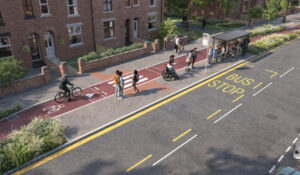Liverpool City Council and partners Colas and Liverpool John Moores University will invest in research and development of highway material processes as part of its Live Labs 2 project.
Working with local highways contractors Huyton Civils, the authority’s successful pitch, the Ecosystem of Things, will look at every step of the maintenance process, be it the fuel vehicles use, to deploying cutting edge materials technology.
The aim is to improve the city’s recycling infrastructure as well as the legal, contractual and procurement processes to help decarbonise the city’s roads.
The funding will be invested across three demonstrator projects – in the north, south and east of the city. They will explore how best to green up the city’s approach from design to construction.
Liverpool City Council has already begun a major programme to install LED street lights and is currently rolling out a new network of cycle lanes.
Last week it announced a programme to triple the number of on-street electric vehicle charging points, which will make it the most electric car friendly city in the north of England.
Karen Agbabiaka, Liverpool City Council’s Interim chief highways officer, said: “The funding from Live Labs is a fantastic vote of confidence in our plans to use the latest technology to transform how we reduce the carbon footprint of our roads.
“This project will unite the city’s academic and construction prowess and show Liverpool can be truly world-leading on providing solutions on the climate change agenda.”
Liverpool is one of seven local authorities to receive funding from the £30m Live Labs 2 programme.
It has joined forces with a consortium of other councils – Cornwall County Council, Devon County Council, Hampshire County Council and Somerset County Council – to share intelligence, insights and best practice.
Cllr Dan Barrington, Liverpool City Council’s Cabinet Member for Climate Change and Highways, said: “This is really exciting news because this ‘Ecoystem of Things’ project has the potential to radically rethink road construction programmes.”
























